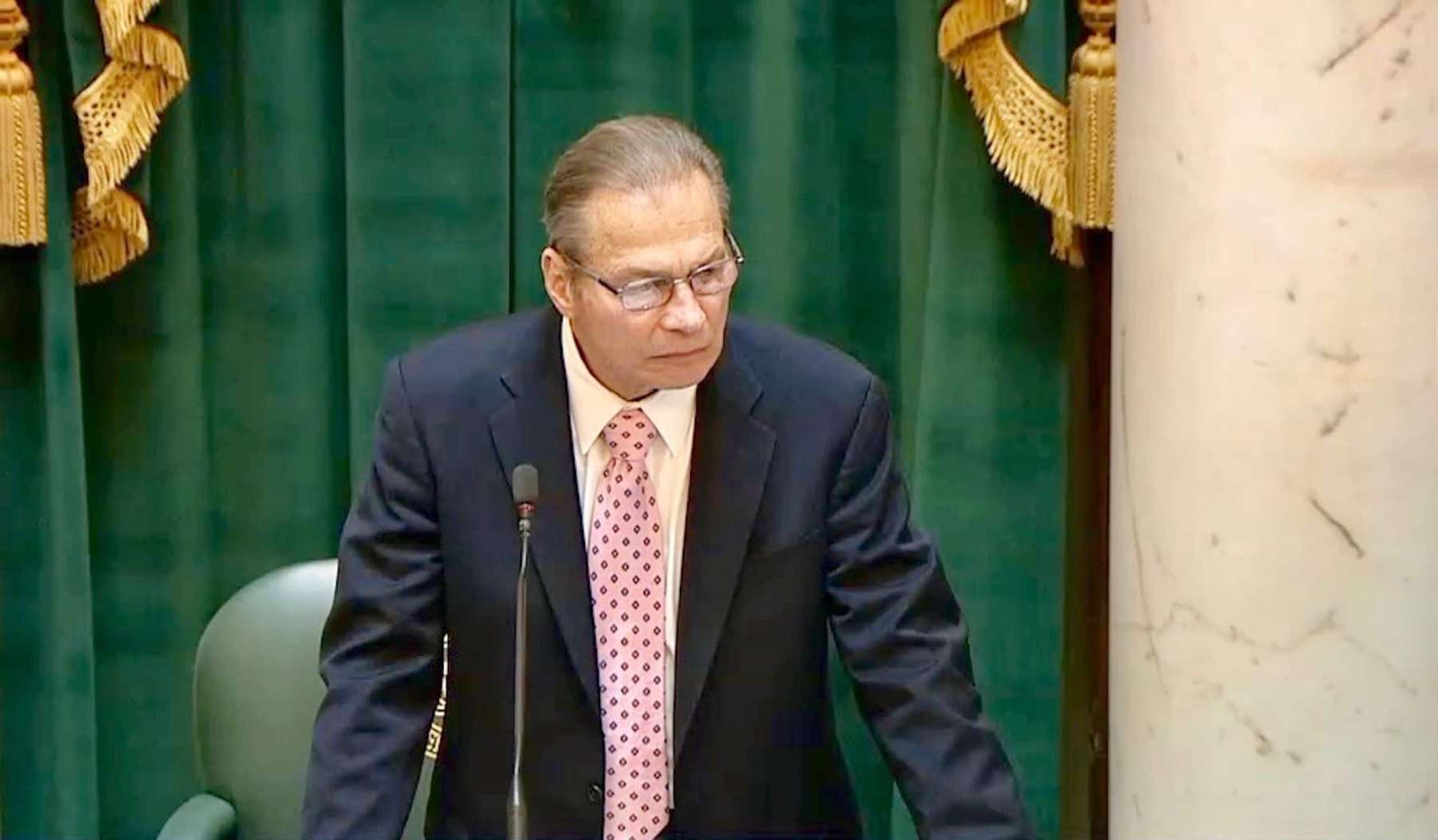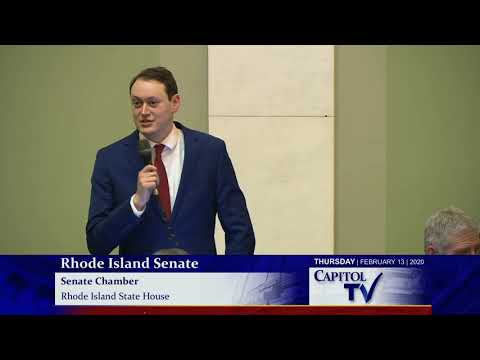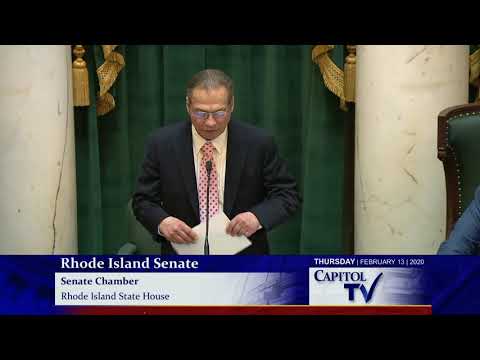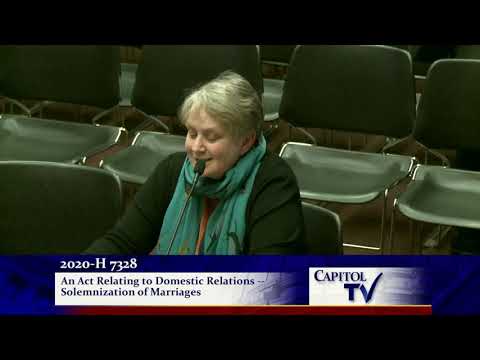The battle for Marriage Equality in Rhode Island continues
“State sanctioned discrimination must always be challenged,” said Wendy Becker, speaking in favor of the bill. “Bundling marriage solemnizations separately by gender and sexual orientation of those getting married seems to allow a system with the expressed purpose of legislators expressing their prejudices more easily.” True marriage equality has been elusive in Rhode Island, despite the state finally allowing same
February 18, 2020, 9:45 am
By Steve Ahlquist
“State sanctioned discrimination must always be challenged,” said Wendy Becker, speaking in favor of the bill. “Bundling marriage solemnizations separately by gender and sexual orientation of those getting married seems to allow a system with the expressed purpose of legislators expressing their prejudices more easily.”
True marriage equality has been elusive in Rhode Island, despite the state finally allowing same sex marriages in 2013 and despite a United States Supreme Court ruling that same sex couples could marry two years later. This is because the General Assembly persists in allowing legislators to vote on marriages where couples request special permission to allow a friend of the family to officiate a marriage.
The process is cumbersome. The prospective couple seeking to be wed by a friend must ask their State Representative or Senator to put a bill into the General Assembly allowing the friend the right to marry them. The bill goes to committee, where it is voted on, then goes to the floor for a full vote, like any other bill. These solemnization of marriage bills, when there are more than one of them to be considered, are bundled together and voted on in a package. The votes, a mere formality before the passage of marriage equality, are now politically charged targets. Certain conservative legislators routinely vote against same sex marriages, or at the very least, abstain. This requires that the same sex marriage bills be separated out and voted on separately.
Having done years of stories on the way the General Assembly routinely discriminates against same-sex couples seeking to marry under the present solemnization of marriage process, the process is starting to show some signs of change. Last Thursday, on the floor of the Senate, Senator Samuel Bell (Democrat, District 5, Providence) rose to object to the Senate taking up the consent calendar, because the one solemnization of marriage bill to be passed was a same sex marriage, and the other solemnization bills were being held, separated, until the next legislative day (presumably Tuesday, February 25).
“We have this great new practice of not segregating these marriages,” said Bell, “so I was hoping we could continue that by bringing all the marriages that came out of judiciary, including the one just read and reported to the consent calendar onto the consent calendar so they’re all treated equally.”
Senator Erin Lynch Prata (Democrat, District 31, Warwick, Cranston) rose to report that she had just become aware that not all of the marriage bills had been reported out. “I think that was an error,” said Lynch Prata.
The consent calendar was held until all the solemnization of marriage bills could be considered together. You can watch the video here:
I wrote about the bill being discussed above here. It concerns the marriage of Little Compton Town Councilmember Andrew Moore.
Though the incident appears to be a big mistake on the part of the Senate, coincidentally the two Senators most likely to vote against a same sex solemnization of marriage bill, Harold Metts (Democrat, District 6, Providence) and Frank Lombardi (Democrat, District 26, Cranston), were absent. See the video here:
Meanwhile, over in the House, where solemnization of marriage bills have been moved from the Judiciary Committee to the Committee on Special Legislation (presumably to protect members of the Judiciary from having to vote against or abstain from voting on same sex marriage bills) a bill was submitted by Representative Katherine Kazarian (Democrat, District 63, East Providence) that would solve the problem by removing the solemnization of marriage practice out of the General Assembly and to the Governor’s office.
House Bill 7328 would “authorize the governor in his or her discretion to designate a justice of the peace in each town or city, as considered expedient, to solemnize marriages. It would also allow the governor to designate any other person to solemnize a particular marriage on a particular date. There would be a fee to obtain a certificate of designation, whether the application is submitted by mail, hand, facsimile or electronically.”
In effect, the Governor’s office would be able to sell, for a small fee, a license for couples to choose the officiant of their choice at their wedding. Kazarian introduced similar legislation last year. The legislation mirrors the way Massachusetts currently handles the process, and takes it out of the legislature’s hands.
“State sanctioned discrimination must always be challenged,” said Wendy Becker, speaking in favor of the bill. “Bundling marriage solemnizations separately by gender and sexual orientation of those getting married seems to allow a system with the expressed purpose of legislators expressing their prejudices more easily. And it seems like that shouldn’t be allowed to happen.”
“I’m sad that there are still legislators who still believe that my 32 year relationship is not worthy of marriage,” continued Becker, “but I’m much sadder that this entire body acquiesces to their beliefs and has actually institutionalized a discriminatory process.”
House Judiciary Chair Robert Craven (Democrat, District 32, North Kingstown) called Becker’s testimony “illuminating.”
Randall Rose also spoke in favor of the legislation, characterizing the bill as a civil rights issue.
Here’s the video:
I have been writing about this issue for years – it goes back as far as the passage of marriage equality in Rhode Island, in 2013.
- Separate and Unequal: How certain State Senators continue to pass judgement on same sex marriages
- In the RI State Senate, LGBTQ marriage is separated and unequal
- State representatives still trolling LGBTQ marriages
- RI General Assembly still voting on marriage equality
- General Assembly persists in its policy of institutionalized bigotry against the LGBTQ community
- Four members of the Rhode Island House just voted against a gay wedding…
- In the eyes of certain State Senators, some marriages are less worthy
- All marriages are equal, but some marriages are more equal than others…
UpriseRI is entirely supported by donations and advertising. Every little bit helps:
Become a Patron!









